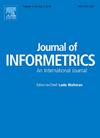The overrepresentation of the United States in the field of legal studies in the science-wide author databases of standardized citation indicators
IF 3.5
2区 管理学
Q2 COMPUTER SCIENCE, INTERDISCIPLINARY APPLICATIONS
引用次数: 0
Abstract
This paper investigates the overrepresentation of U.S.-based scholars in legal studies, focusing on patterns observed in the 2024 Ioannidis Science-wide author databases of standardized citation indicators. The study examines key differences between U.S. and non-U.S. scholars regarding citation metrics, publication patterns, and journal selection, while also evaluating the broader implications of this dominance on the global dissemination of legal knowledge. Via data from Scopus, the study analyzes 766 scholars and their 50,463 publications across both single-year and career-long datasets. The results reveal a marked U.S. dominance, with U.S.-based scholars not only comprising a large share of the dataset but also achieving top-ranking positions across various metrics. U.S. scholars predominantly publish in prestigious American law journals tied to Ivy League institutions, often resulting in higher citation counts and visibility than their non-U.S. counterparts. Conversely, non-U.S. scholars are more likely to publish in international or European journals, which generally yield lower citation metrics. Our results suggest that American legal scholarship maintains a citation ecosystem that reinforces its central position in the field, often sidelining Global South perspectives. These findings should also be interpreted in light of the substantial U.S.-bias inherent in the Scopus-indexed data underpinning the Stanford list, which structurally privileges U.S.-based publication formats and legal venues.
在标准化引文指标的科学范围作者数据库中,美国在法律研究领域的代表性过高
本文调查了美国学者在法律研究中的过度代表性,重点关注了2024年Ioannidis science的标准化引文指标作者数据库中观察到的模式。该研究调查了美国和非美国之间的主要差异。学者关于引用指标,出版模式和期刊选择,同时也评估这种主导地位对全球法律知识传播的更广泛影响。通过Scopus的数据,该研究分析了766名学者及其50,463篇论文,包括一年和职业生涯的数据集。结果显示出明显的美国主导地位,美国学者不仅占数据集的很大份额,而且在各种指标上都名列前茅。美国学者主要在与常青藤盟校有关的著名美国法律期刊上发表文章,这往往导致他们的论文被引用次数和知名度高于非美国学者。同行。相反,美国。学者更有可能在国际或欧洲期刊上发表论文,这些期刊的引用率通常较低。我们的研究结果表明,美国法律学术维持着一个引文生态系统,巩固了其在该领域的中心地位,经常将全球南方的观点边缘化。这些发现也应该根据支撑斯坦福大学榜单的scopus索引数据固有的巨大美国偏见来解释,这些数据在结构上优先考虑美国的出版格式和法律场所。
本文章由计算机程序翻译,如有差异,请以英文原文为准。
求助全文
约1分钟内获得全文
求助全文
来源期刊

Journal of Informetrics
Social Sciences-Library and Information Sciences
CiteScore
6.40
自引率
16.20%
发文量
95
期刊介绍:
Journal of Informetrics (JOI) publishes rigorous high-quality research on quantitative aspects of information science. The main focus of the journal is on topics in bibliometrics, scientometrics, webometrics, patentometrics, altmetrics and research evaluation. Contributions studying informetric problems using methods from other quantitative fields, such as mathematics, statistics, computer science, economics and econometrics, and network science, are especially encouraged. JOI publishes both theoretical and empirical work. In general, case studies, for instance a bibliometric analysis focusing on a specific research field or a specific country, are not considered suitable for publication in JOI, unless they contain innovative methodological elements.
 求助内容:
求助内容: 应助结果提醒方式:
应助结果提醒方式:


